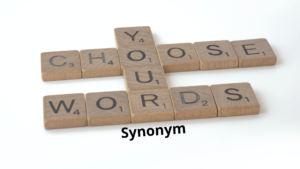
a word that has the same or almost the same meaning as another word
Writers often ask themselves, “Is this the best word to use?” Appropriate use of synonyms can provide clarity, pack information, prevent redundancy or even curtail the overuse of certain words.
What makes this an important topic?
It’s important because the accuracy of words matters. When I work with young writers, I spend a lot of time on diction. One of the biggest problems is these writers are not careful about how they select synonyms. Instead of right-clicking to choose an equivalent, study word meanings and expand your vocabulary. That doesn’t mean you should avoid using the synonyms provided by your word processor. Use them! Nevertheless, it’s essential to know the subtle difference between the listed words.

The Trouble with Synonyms: An Example
A good word example is prestidigitator. People have called thieves prestidigitators, or more specifically pick pockets and magicians get that label. But prestidigitator does not mean pick pocket or magician. It means “quick fingered” an aspect which describes what thieves and magicians do but not what or who they are.
If someone were to write, “he is a real prestidigitator” they reveal that the person is quick fingered and no more. Thus, this word is not a synonym for pick pocketer or magician as it is often used. Yet one could correctly say, “That magician is a real prestidigitator.” Then afterwards, they should check to ensure they still have a wallet.
To become a better writer, expand your vocabulary and make the thesaurus your friend.



